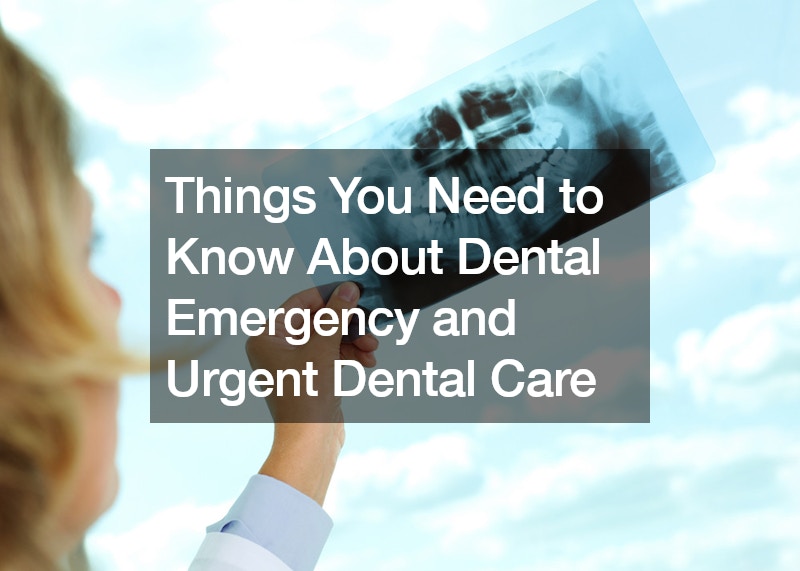Dental emergencies can happen unexpectedly, often requiring immediate attention to prevent further complications or permanent damage. Understanding what constitutes a dental emergency and knowing how to respond can be crucial in preserving your oral health.
Types of Dental Emergencies
Dental emergencies can encompass a wide range of situations, each requiring prompt attention and appropriate treatment. Here are some common types of dental emergencies:
Severe Tooth Pain: Persistent or severe toothache can indicate an underlying issue such as infection, decay, or nerve damage. Immediate dental evaluation is necessary to diagnose the cause of the pain and provide relief.
Broken or Chipped Teeth: Trauma, accidents, or biting down on hard objects can result in fractured or chipped teeth. Depending on the extent of damage, urgent dental care may be required to restore the tooth’s structure and prevent further complications.
Knocked-Out Tooth (Avulsed Tooth): A knocked-out tooth can occur due to sports injuries, falls, or accidents. If possible, gently rinse the tooth with water, avoiding touching the root, and attempt to reinsert it into the socket. Alternatively, store the tooth in milk or saliva and seek immediate dental attention for the best chance of saving the tooth.
Loose or Dislodged Teeth: Teeth that are partially dislodged or loosened from their sockets due to trauma or injury require urgent dental evaluation. Prompt treatment can help stabilize the tooth and prevent further damage.
Dental Abscess or Infection: This type of infection can cause extreme pain and severe inflammation. These conditions require immediate dental care to drain the abscess, remove infected tissue, and administer antibiotics to prevent the infection from spreading.
Lost Dental Restorations: Losing a filling, crown, or dental implant can expose the underlying tooth structure and lead to sensitivity or discomfort. Seeking prompt dental care is essential to replace the lost restoration and protect the tooth from further damage.
Soft Tissue Injuries: Injuries to the lips, gums, tongue, or cheeks can result in lacerations, tears, or puncture wounds. Immediate first aid, such as cleaning the affected area and applying pressure to control bleeding, followed by dental evaluation, is necessary to assess and treat soft tissue injuries effectively.
Orthodontic Emergencies: Problems with orthodontic appliances, such as broken braces, protruding wires, or displaced brackets, can cause discomfort or injury to the soft tissues of the mouth. Orthodontic emergencies require timely attention from an orthodontist to address the issue and prevent further complications.
Here are some key points to consider when dealing with dental emergencies and seeking urgent dental care.
Preventing Dental Emergencies: While accidents can happen, taking precautions can significantly reduce the risk of dental emergencies. For individuals engaged in recreational sports or activities with a high risk of dental trauma, wearing a custom mouthguard is highly recommended. These mouthguards provide essential protection for the teeth, tongue, and cheeks during physical activities, minimizing the likelihood of injuries.
Avoiding Harmful Habits: Certain habits can increase the risk of dental emergencies. For instance, using teeth as tools to cut or tear objects like tape can lead to chipped or broken teeth. It’s essential to use scissors or appropriate tools instead of relying on teeth for such tasks. Additionally, refraining from chewing on hard objects like ice, popcorn kernels, or hard candies can prevent dental injuries and fractures.
Knowing Your Options: In case of a dental emergency, it’s crucial to know your available options for seeking urgent dental care. Many dental practices offer extended office hours or have protocols in place to accommodate emergencies outside regular business hours. Some dentists even provide 24-hour services to address urgent dental needs promptly.
Seeking Professional Help: Depending on the severity of the dental emergency, seeking prompt professional help is essential. If you experience severe pain, trauma to the teeth or gums, or any other urgent dental issue, contacting an urgent care dentist or visiting an emergency dental clinic is recommended. These professionals have the expertise and resources to assess the situation and provide appropriate treatment.
Considering Hospital Care: In some cases, the severity of a dental emergency may require immediate medical attention at a hospital emergency room. This is particularly true for situations involving significant trauma, severe bleeding, or suspected fractures of the jaw or facial bones. Hospital emergency departments can provide necessary medical care and coordinate with dental specialists if needed.
Having a Backup Plan: It’s wise to have a backup plan in place for dental emergencies, especially when traveling or during holidays when dental offices may have limited hours. Knowing the location of nearby emergency dental clinics or hospitals equipped to handle dental trauma can be invaluable in urgent situations.
Maintaining Oral Health: While dental emergencies require immediate attention, proactive oral care can help prevent many issues from arising in the first place. Routine dental check-ups, good oral hygiene practices, and healthy lifestyle habits contribute to maintaining optimal oral health and reducing the risk of emergencies.
In conclusion, being prepared and informed about dental emergencies is essential for protecting your oral health. By taking preventive measures, knowing your options for urgent dental care, and seeking prompt professional help when needed, you can effectively address dental emergencies and minimize their impact on your overall well-being. Remember to prioritize oral health and take proactive steps to prevent dental emergencies whenever possible.
.


